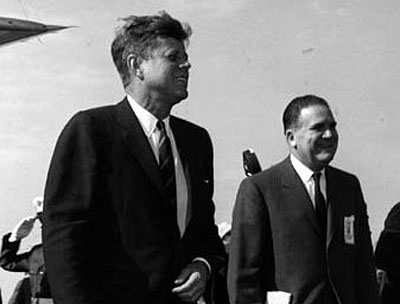Murdering Apollo: John F. Kennedy and the retreat from the lunar goal (part 1)by Dwayne A. Day
|
| Considering that the two nations had been to the brink of nuclear war only a year before, this was a rather startling attempt at rapprochement. |
What led to Kennedy’s decision to make this proposal in the UN at that time? Unfortunately, the paper record is insufficient to answer this question. During a March 1964 interview, Kennedy advisor Theodore Sorensen was asked about what motivated Kennedy’s offer to the Soviet Union. Sorensen replied that the high costs of Apollo may have been a factor. “I think he was understandably reluctant to continue that rate of increase. He wished to find ways to spend less money on the program and to cut out the fat which he was convinced was in the budget. How much that motivated his offer to the Russians, though, I don’t know.” But Sorensen admitted that he was not very familiar with the issue.
Echoes of a distant past
The answer to the question of why Kennedy made his overture may exist in the form of a tape recording of a meeting between Kennedy and NASA administrator James Webb two days before Kennedy’s speech before the UN. That tape is recording number 111/A46 in the Kennedy Presidential Library (a log of the recordings in the library can be found here.)
We know that such recordings can shed substantial light on Kennedy’s thinking on space because of another tape that was released five years ago and gained a surprising amount of media attention in the sleepy month of August 2001. That recording, number 60 in the Kennedy Library, concerned a November 1962 meeting between Kennedy, Webb, and several other top White House and NASA officials to discuss the NASA budget. During that meeting, Kennedy made the comment that “I’m not that interested in space…” explaining that he supported the lunar program because it was a race against the Soviets: “the Soviet Union has made this a test of the system. So that’s why we’re doing it,” Kennedy explained. (In 2002 I assisted NASA in transcribing and analyzing the meeting.)
Many people who thought that Kennedy was a space enthusiast were surprised by that tape, and it offers fascinating insight into the deliberations over Apollo at the senior levels of the administration at that time. The tape recording of Kennedy’s September 1963 discussion with Webb could be similarly revelatory.
Unfortunately, presidential libraries operate in an unusual legal environment. These audio recordings were originally turned over to the Kennedy Library by the Kennedy family in 1976, and significant numbers of them have been released in the last three decades. Unfortunately, the recordings are not subject to normal review and declassification like other government records, nor can scholars who possess top security clearances listen to them at the library. Apparently, only those scholars who have a special relationship with the Kennedy Library (which usually means a special relationship with the Kennedy family), can gain access to the recordings outside of the normal processing and release schedule.
The library’s only comment on this is in the audio recording finding log that states that “Due to the time involved in processing recordings, the Library will continue to process and open remaining material incrementally as it is ready.” But in response to a question, a Kennedy Library spokesman explained that audio recording review and release has been suspended in order to comply with government regulations concerning the declassification of paper records. It is therefore not possible to know when this tape might be reviewed for release. (My own best guess is that it may be five to ten years before the tape is released, based on the very slow rate of progress so far.)
| Maybe someday, when the Kennedy Library finally releases that last key tape, we may have a little less uncertainty. |
There is little point in lamenting or fulminating over the fact that historically valuable documents remain inaccessible to historians long after the information they contain is no longer politically or militarily sensitive. Millions of national security documents remain classified even though their release poses no threat to national security. The reasons for this include lack of resources for declassification, larger policy concerns (both legitimate and illegitimate), simple bureaucratic disinterest… and stupidity. It would be hard for a historian to argue that this particular audio recording from September 1963 is more important than other recordings concerning Kennedy’s civil rights, nuclear arms, or Vietnam policies. However, this tape remains one of the key unreleased records on Kennedy’s civilian space policy.
Definitive answers are rare when studying history. But maybe someday, when the Kennedy Library finally releases that last key tape, we may have a little less uncertainty.
